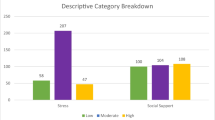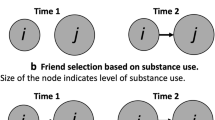Abstract
Prosocial behavior (PSB) is vital for positive social development among adolescents, contributing to improved peer relationships, emotional well-being, and social competence. Gratitude, a positive emotion arising from recognizing and appreciating benefits received from others, has been identified as a potential contributor to adolescent PSB. This study aimed to investigate the mediating roles of social support (SS) and basic psychological needs (BPNs) in the relationship between gratitude and PSB among adolescents. A total of 390 middle school students participated in a longitudinal study, completing questionnaires assessing gratitude, SS, BPNs and PSB at two time points with a six-month interval. The results indicated that gratitude positively correlated with SS, BPNs, and PSB. Structural equation modeling revealed that SS, competence needs and relatedness needs partially mediated the relationship between gratitude and adolescent PSB. Moreover, a chain-like mediation effect was observed, wherein SS influenced autonomy needs and relatedness needs, which in turn predicted PSB. These findings emphasize the importance of gratitude in fostering PSB among adolescents and highlight the mediating roles of SS and BPNs in this relationship. Furthermore, our study elucidated the different roles of the three BPNs and further refine and expand the self-determination theory.

Similar content being viewed by others
Data availability
The data that support the findings of this study are available from the corresponding author, upon reasonable request.
References
Algoe, S. B. (2012). Find, remind, and bind: The functions of gratitude in everyday relationships. Social and Personality Psychology Compass, 6(6), 455–469. https://doi.org/10.1111/j.1751-9004.2012.00439.x.
Bos, M. W., Kret, M. E., de Rooij, M., & van Honk, J. (2018). Giving behavior of adolescents: Intergenerational differences and the role of empathy and testosterone. Frontiers in Psychology, 9, 2483.
Cirelli, L. K., Einarson, K. M., & Trainor, L. J. (2014). Interpersonal synchrony increases prosocial behavior in infants. Developmental Science, 17(6), 1003–1011. https://doi.org/10.1111/desc.12193.
Davis, A. N., Luce, H., & Davalos, N. (2018). Associations among Life events, empathic concern, and adolescents’ prosocial and aggressive behaviors toward specific targets. The Journal of Genetic Psychology, 179(4), 183–197. https://doi.org/10.1080/00221325.2018.1468314.
de Guzman, M. R. T., Jung, E., & Anh Do, K. (2012). Perceived social support networks and prosocial outcomes among Latino/a youth in the United States. Revista Interamericana De Psicología, 46(3), 413–424.
Deci, E. L., & Ryan, R. M. (2000). The what and why of goal pursuits: Human needs and the self-determination of behavior. Psychological Inquiry, 11(4), 227–268. https://doi.org/10.1207/S15327965PLI1104_01.
Deci, E. L., & Ryan, R. M. (Eds.). (2002). Handbook of self-determination research. University of Rochester Press.
Eisenberg, N., & Morris, A. S. (2002). Children’s emotion-related regulation. Advances in Child Development and Behavior, 30, 189–229.
Eisenberg, N., Spinrad, T. L., & Knafo-Noam, A. (2015). Prosocial development. In M. E. Lamb, & R. M. Lerner (Eds.), Handbook of child psychology and developmental science: Socioemotional processes (pp. 610–656). John Wiley & Sons, Inc. https://doi.org/10.1002/9781118963418.childpsy315.
Fredrickson, B. L. (1998). What Good Are Positive Emotions? Review of general psychology: journal of Division 1, of the American Psychological Association, 2(3), 300–319. https://doi.org/10.1037/1089-2680.2.3.300.
Fredrickson, B. L. (2001). The role of positive emotions in positive psychology. The broaden-and-build theory of positive emotions. The American Psychologist, 56(3), 218–226. https://doi.org/10.1037//0003-066x.56.3.218.
Fredrickson, B. L. (2004). Gratitude, Like other positive emotions, broadens and builds. In R. A. Emmons, & M. E. McCullough (Eds.), The psychology of gratitude (pp. 145–166). Oxford University Press. https://doi.org/10.1093/acprof:oso/9780195150100.003.0008.
Froh, J. J., & Bono, G. (2016). Gratitude in children and adolescents: Development, assessment, and school-based intervention. In K. M. Sheldon, T. B. Kashdan, & M. F. Steger (Eds.), Designing positive psychology: Taking stock and moving Forward (pp. 191–209). Oxford University Press.
Froh, J. J., Bono, G., & Emmons, R. (2010). Being grateful is beyond good manners: Gratitude and motivation to contribute to society among early adolescents. Motivation and Emotion, 34(2), 144–157. https://doi.org/10.1007/s11031-010-9163-z.
Gao, Q., Zheng, H., Sun, R., & Lu, S. (2022). Parent-adolescent relationships, peer relationships, and adolescent mobile phone addiction: The mediating role of psychological needs satisfaction. Addictive behaviors, 129, Article 107260. https://doi.org/10.1016/j.addbeh.2022.107260.
González-Cutre, Romero-Elías, M., Jiménez-Loaisa, A., Beltrán-Carrillo, V. J., & Hagger, M. S. (2020). Testing the need for novelty as a candidate need in basic psychological needs theory. Motivation and Emotion, 44(2), 295–314. https://doi.org/10.1007/s11031-019-09812-7.
Gordon, A. K. (2012). Does gratitude mitigate the negative consequences of social support? Applied Psychology: Health and Well-Being, 4(3), 386–407.
Grant, A. M., & Gino, F. (2010). A little thanks goes a long way: Explaining why gratitude expressions motivate prosocial behavior. Journal of Personality and Social Psychology, 98(6), 946–955. https://doi.org/10.1037/a0017935.
Kashdan, T. B., Mishra, A., Breen, W. E., & Froh, J. J. (2009). Gender differences in gratitude: Examining appraisals, narratives, the willingness to express emotions, and changes in psychological needs. Journal of Personality, 77(3), 691–730. https://doi.org/10.1111/j.1467-6494.2009.00562.x.
Kong, F., Yang, K., Yan, W., & Li, X. (2021). How does Trait Gratitude relate to Subjective Well-being in Chinese adolescents? The Mediating Role of Resilience and Social Support. Journal of Happiness Studies, 22(4), 1611–1622. https://doi.org/10.1007/s10902-020-00286-w.
La Guardia, J. G., Ryan, R. M., Couchman, C. E., & Deci, E. L. (2000). Within-person variation in security of attachment: A self-determination theory perspective on attachment, need fulfillment, and well-being. Journal of Personality and Social Psychology, 79(3), 367–384. https://doi.org/10.1037/0022-3514.79.3.367.
Lan, X. (2022). Left-behind youth are not always bad! Relations between teacher autonomy support, narcissism, and prosocial behavior. Current Psychology (New Brunswick. https://doi.org/10.1007/s12144-022-03610-0.
Laporte, N., Soenens, B., Brenning, K., & Vansteenkiste, M. (2021). Adolescents as active managers of their own psychological needs: The role of psychological need crafting in adolescents’ mental health. Journal of Adolescence, 88, 67–83. https://doi.org/10.1016/j.adolescence.2021.02.004.
Legault, L. (2017). The need for competence. In V. Zeigler-Hill, & T. Shackelford (Eds.), Encyclopedia of personality and individual differences. Springer. https://doi.org/10.1007/978-3-319-28099-8_1123-1.
Leow, K., Lynch, M. F., & Lee, J. (2021). Social Support, Basic Psychological needs, and Social Well-Being among Older Cancer survivors. International Journal of Aging & Human Development, 92(1), 100–114. https://doi.org/10.1177/0091415019887688.
Li, W., Guo, F., & Chen, Z. (2019). The Effect of Social Support on adolescents’ Prosocial Behavior: A serial mediation model. Chinese Journal of Clinical Psychology, 27(4), 812–821. (in Chinese).
Liu, X., Ma, D., Liu, L., Zhao, G., Li, C., Yang, J., & Sun, L. (1998). Development of the post-traumatic stress disorder self-rating scale and its reliability and validity. Chinese Journal of Behavioral Medicine and Brain Science, 7(2), 93–96. https://doi.org/10.16128/j.cnki.1005.
Liu, D., Jiang, Y., Wu, F., Yang, X., & Huang, R. (2022). Distinct roles of perceived teacher and peer relationships in adolescent students’ academic motivation and outcomes: Father absence as a moderator. Journal of Pacific Rim Psychology Article, 16. https://doi.org/10.1177/18344909221146236.
Ma, C., Mastrotheodoros, S., & Lan, X. (2022). Linking classmate autonomy support with prosocial behavior in Chinese left-behind adolescents: The moderating role of self-esteem and grit. Personality and Individual Differences, 195, 1–11. https://doi.org/10.1016/j.paid.2022.111679.
McCullough, M. E., Kilpatrick, S. D., Emmons, R. A., & Larson, D. B. (2001). Is gratitude a moral affect? Psychological Bulletin, 127(2), 249–266. https://doi.org/10.1037/0033-2909.127.2.249.
McCullough, M. E., Emmons, R. A., & Tsang, J. A. (2002). The grateful disposition: A conceptual and empirical topography. Journal of Personality and Social Psychology, 82(1), 112–127. https://doi.org/10.1037/0022-3514.82.1.112.
Moradi, M., Sheikholeslami, R., Ahmadzadeh, M., & Cheraghi, A. (2014). Social support, basic psychological needs and psychological well-being: Examining a causal model in employed women. Developmental Psychology, 10(39), 297–309.
Reyes, Unanue, W., Gómez, M., Bravo, D., Unanue, J., Araya-Veliz, C., & Cortez, D. (2022). Dispositional Gratitude as an underlying psychological process between materialism and the satisfaction and frustration of Basic Psychological needs: A longitudinal Mediational Analysis. Journal of Happiness Studies, 23(2), 561–586. https://doi.org/10.1007/s10902-021-00414-0.
Ryan, R. M., & Deci, E. L. (2000). Self-determination theory and the facilitation of intrinsic motivation, social development, and well-being. American Psychologist, 55(1), 68–78. https://doi.org/10.1037/0003-066X.55.1.68.
Shin, H., & Park, C. (2022). Social support and psychological well-being in younger and older adults: The mediating effects of basic psychological need satisfaction. Frontiers in Psychology, 13, Article 1051968. https://doi.org/10.3389/fpsyg.2022.1051968.
Sumter, S. R., Bokhorst, C. L., Steinberg, L., & Westenberg, P. M. (2009). The developmental pattern of resistance to peer influence in adolescence: Will the teenager ever be able to resist? Journal of Adolescence, 32(4), 1009–1021. https://doi.org/10.1016/j.adolescence.2008.08.010.
Tian, L., Pi, L., Huebner, E. S., & Du, M. (2016). Gratitude and adolescents’ subjective well-being in school: The multiple mediating roles of basic psychological needs satisfaction at school. Frontiers in Psychology, 7, Article 1409. https://doi.org/10.3389/fpsyg.2016.01409.
Tian, L., Zhang, X., & Huebner, E. S. (2018). The Effects of Satisfaction of Basic Psychological Needs at School on Children’s Prosocial Behavior and Antisocial Behavior: The Mediating Role of School Satisfaction. Frontiers in Psychology, 9, Article 548. https://doi.org/10.3389/fpsyg.2018.00548.
Van der Graaff, J., Carlo, G., Crocetti, E., Koot, H. M., & Branje, S. (2018). Prosocial behavior in adolescence: Gender differences in development and links with empathy. Journal of Youth and Adolescence, 47(5), 1086–1099. https://doi.org/10.1007/s10964-017-0786-1.
Vansteenkiste, M., Ryan, R. M., & Soenens, B. (2020). Basic psychological need theory: Advancements, critical themes, and future directions. Motivation and Emotion, 44(1), 1–31. https://doi.org/10.1007/s11031-019-09818-1.
Wood, A. M., Froh, J. J., & Geraghty, A. W. (2010). Gratitude and well-being: A review and theoretical integration. Clinical Psychology Review, 30(7), 890–905. https://doi.org/10.1016/j.cpr.2010.03.005.
You, S., Lee, J., & Lee, Y. (2022). Relationships between gratitude, social support, and prosocial and problem behaviors. Current Psychology: Research & Reviews, 41(5), 2646–2653. https://doi.org/10.1007/s12144-020-00775-4.
Zhang, D. (2022). The relationship between gratitude and adolescents’ prosocial behavior: A moderated mediation model. Frontiers in Psychology, 13, Article 1024312. https://doi.org/10.3389/fpsyg.2022.1024312.
Zhang, Q. P., & Kou, Y. (2011). The dimension of measurement on prosocial behavior: Exploration and confirmation. Sociology Research, (4), 105–121. (in Chinese).
Zou, H. (1999). Social support networks and peer relationships in middle school students. Journal of Beijing Normal University (Social Science Edition), (1), 34–42. (in Chinese).
Acknowledgements
We much appreciate the participants and research assistants involved in the present research.
Funding
The current study was supported by “The Humanities and Social Sciences Youth Foundation of Ministry of Education of China” (Project No. 22YJC190023).
Author information
Authors and Affiliations
Contributions
Conceptualization, Q.Y.; methodology, W.W.; data curation, W.W.; writing—original draft preparation, Q.Y.; writing—review and editing, P.W., X.X., L.Z., S.Z.; visualization, P.W.; supervision, W.W.; project administration, W.W.; funding acquisition, W.W. All authors have read and agreed to the published version of the manuscript.
Corresponding author
Ethics declarations
Institutional review board statement
This study was approved by the Human Research Ethics Committee of Beijing Normal University. The procedures used in this study adhere to the tenets of the Declaration of Helsinki.
Consent to participate
Informed consent was obtained from all individual participants included in the study.
Competing interests
The authors have no competing interests to declare that are relevant to the content of this article.
Additional information
Publisher’s Note
Springer Nature remains neutral with regard to jurisdictional claims in published maps and institutional affiliations.
Rights and permissions
Springer Nature or its licensor (e.g. a society or other partner) holds exclusive rights to this article under a publishing agreement with the author(s) or other rightsholder(s); author self-archiving of the accepted manuscript version of this article is solely governed by the terms of such publishing agreement and applicable law.
About this article
Cite this article
Yu, Q., Wang, P., Xia, X. et al. The mediating roles of social support and basic psychological needs in the relationship between gratitude and adolescent prosocial behavior. Curr Psychol 43, 15342–15351 (2024). https://doi.org/10.1007/s12144-023-05515-y
Accepted:
Published:
Issue Date:
DOI: https://doi.org/10.1007/s12144-023-05515-y




